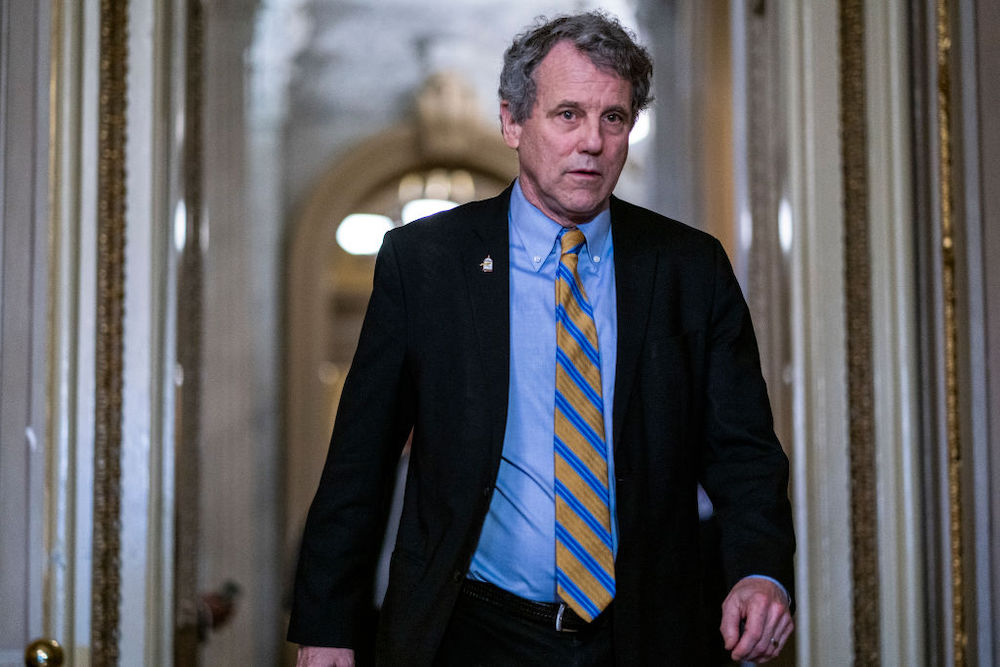- To prevent a financial collapse, companies need to consider all its stakeholders, not just shareholders, Sen. Sherrod Brown said in a webinar.
- The Ohio Democrat plans to push for legislation protecting workers’ rights and requiring companies to share profits with workers during a stock buyback.
- Brown hopes to push the Senate Banking, Housing and Urban Affairs Committee to address financial issues to tackle racial disparities, income inequality and the climate crisis.
Shifting corporate focus from shareholders’ profit-driven concerns to a broader consideration of a variety of stakeholders’ needs is essential to rebuilding the economy following the COVID-19 pandemic, Sen. Sherrod Brown (D-Ohio) said Tuesday at a webinar about preventing another financial crash.
“The goal has to be to reorient our economy from Wall Street Wealth to the dignity of work,” Brown said at the event sponsored by Better Markets to mark the anniversary of the Lehman Brothers bankruptcy that sparked the 2008 financial crisis. “We have to end the Wall Street business model that only measures the economy in quarterly earnings reports and treats workers as expendable. It’s not a coincidence that so often it’s Black workers and brown workers getting exploited the most by these corporations. A woman, a grocery store worker in Southwest Ohio said to me one day, ‘You know, they call me essential, but we know we’re expendable because they don’t pay us much and they don’t protect us on the job.’”
Brown added that Better Markets’ report “Road to Recovery: Protecting Main Street from President Trump’s Dangerous Deregulation of Wall Street,” which was released Tuesday and outlined moves made by the Trump administration that loosened oversight of the financial industry, offered a list of changes that Democrats need to make.
“If Joe Biden wins in November, if Democrats take back the Senate, we have a lot of work to do to undo the damage that Trump and his regulators — deregulator is a better word — have done to our financial system,” Brown said. “But we should aim higher than just trying to prevent economic catastrophe. We want the economy to actually work for workers and our families… We have a real opportunity to change it and I really feel that next January we’re going to do great things. Great progress comes out of really dark times.”
Dennis Kelleher, co-founder and CEO of Better Markets, which is a nonpartisan nonprofit founded to promote public interest in financial markets, said the group’s report found that during the Trump administration the restrictions placed on banks to prevent another financial collapse have been weakened, which has broader implications.
“What happens on Wall Street doesn’t stay on Wall Street,” Kelleher said. “It dramatically impacts Main Street families and businesses in catastrophic ways. It can kill economic growth, throw millions of Americans out of their jobs and homes, vaporize savings, increase inequality and hollow out the middle class, which is exactly what happened as a direct result of the 2008 crash. Less visible, but no less important, that also happens on a smaller scale whenever Wall Street focuses on high-risk, antisocial, bonus-boosting trading and investments rather than supporting the real productive economy. And that’s why protecting Main Street from Wall Street’s high risk and dangerous activities are so fundamentally important to prevent financial crashes, to make banks focus on serving the real economy and real people and to protect workers, homeowners, savers, taxpayers, our financial system, our economy, and, ultimately, the American Dream itself.”
Brown, the ranking member on the Senate’s Banking, Housing and Urban Affairs Committee, said following the November election he plans to push for a bill protecting workers’ rights to organize and join unions, as well as a bill that would require companies to share their profits with workers when they do a stock buyback.
“I see [the committee] as a place to begin to better attack structural racism because racial disparities, housing, the justice system, wealth inequality, and healthcare are so related,” Brown said. “The pandemic was the great revealer. It revealed racial disparities and revealed more about income inequality. It revealed holes in our public health system, putting it mildly… I think the country will begin to think differently about this.”
Photo by Zach Gibson/Getty Images






















